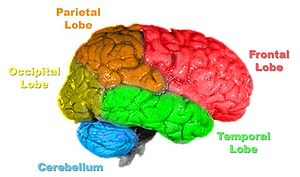 |
| Lobes of the brain, color-coded. (Photo credit: Wikipedia) |
I suspect it happens to us
all from time to time: we have a day when the brain just refuses to do what is
required of it. Today has been such a day for me. Why? That’s easy. I’m
suffering some sort of stomach bug that has meant I’ve needed to be close to
the bathroom all day. I managed a swift walk around the block for fresh air and
exercise but that’s all. Now, I’ve had this sort of event before (as a
recovering ME sufferer, my immune system isn’t what it was and I’m a bit
vulnerable to those idiots at my day job who fail to wash their hands after a
visit to the loo: such thoughtful folk, eh?)
Generally, the effect is
to deaden the creative and constructive part of my brain so that everything
becomes a real effort; like trying to think clearly through clouded water. And,
generally, my response to the physical results of such infection is to starve
myself for 24 hours, consuming only apple juice warmed and sweetened – a trick
I learned from a doctor years ago, which seems to work. But, of course, the
energy levels suffer as a result and anything that demands extra effort is just
a little too much.
So, what to do with the
time? I suppose I could just give in and rest for the day. Read, perhaps? But
I’ve been busy recently, devising and publishing a new book. And that means the
emails have piled up. So, I spent a good part of the day dealing with those.
Most of them are relatively undemanding, so not too difficult to make progress
through the numbers and clear the decks for tomorrow, when, hopefully, I’ll be
able to do some writing. I also had the basic themes of a review worked out in my
head, so I was able to put that together and stick on the blog and Goodreads.
And that’s really what
this piece is about. How to make the best of whatever situation you find
yourself in. I could’ve given up and spent the day in bed. But what would that
have achieved? I’d have been bored to tears and all those emails would still
have been waiting for me in the morning to disrupt my return to normality.
I’m very lucky; years of
writing have made it relatively easy for me to respond in plain language to
messages. As long as I don’t have to get too creative when I’m in this state, I
can generally manage to string some words together. But I couldn’t do anything
that required the imagination and sheer concentration necessary for making a
story. So, I do what I can do and hope to make the time that follows the
incident more productive as a result.
I’m curious about how
others deal with this sort of brain dulling. How do you cope? What do you do?
Let’s share our experiences in the hope someone else may pick up a tip to deal
with a similar situation when it creeps up on them.




2 comments:
Unlike your good self, the only ailment I suffer with is old age Stuart. I have been stuck on one chapter in my latest WIP for three weeks, seemingly unable to complete it. Each morning I fired up this laptop and opened up the Word file fully intending to complete the chapter. Unfortunately my brain refused to kick into play. Instead I read, wrote a few more articles for Angie's DIARY, wrote a few blog posts, answered emails, chatted with FB friends, ate, watched a couple of programs on television. In short I did everything besides thinking about the particular point in the storyline of my WIP which was causing me so much trouble. I can now report that this morning I finally completed the chapter in question. In other words, do something else for a while... :)
Great to hear you've resolved that issue, Jack. Frustrating when it just won't work for you, but, as you say, a bit of distraction can work wonders. Fortunately, I'm rarely bothered by such barriers, almost always by some physical ailment that, combined with the brain disorders that come with ME/CFS, prevent the thought processes from operating effectively. Back to normal (what's that?) now, I'm pleased to say. It's good to know that you made positive use of the 'down' time as well, instead of allowing it to become the barrier to progress.
Post a Comment